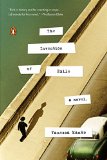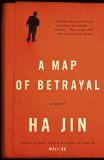Summary | Excerpt | Reading Guide | Reviews | Beyond the book | Read-Alikes | Genres & Themes | Author Bio

A Novel
by Vanessa MankoThrough the unforgettable character of Austin Voronkov, Manko explores the little-known period in American history of the Palmer Raids and the far-reaching implications of exile and loss.
Austin Voronkov is many things. He is an engineer, an inventor, an immigrant from Russia to Bridgeport, Connecticut, in 1913, where he gets a job at a rifle factory. At the house where he rents a room, he falls in love with a woman named Julia, who becomes his wife and the mother of his three children. When Austin is wrongly accused of attending anarchist gatherings his limited grasp of English condemns him to his fate as a deportee, retreating with his new bride to his home in Russia, where he and his young family become embroiled in the Civil War and must flee once again, to Mexico.
While Julia and the children are eventually able to return to the U.S., Austin becomes indefinitely stranded in Mexico City because of the black mark on his record. He keeps a daily correspondence with Julia, as they each exchange their hopes and fears for the future, and as they struggle to remain a family across a distance of two countries. Austin becomes convinced that his engineering designs will be awarded patents, thereby paving the way for the government to approve his return and award his long sought-after American citizenship. At the same time he becomes convinced that an FBI agent is monitoring his every move, with the intent of blocking any possible return to the United States.
Austin and Julia's struggles build to crisis and heartrending resolution in this dazzling, sweeping debut. The novel is based in part on Vanessa Manko's family history and the life of a grandfather she never knew. Manko used this history as a jumping off point for the novel, which focuses on borders between the past and present, sanity and madness, while the very real U.S-Mexico border looms. The novel also explores how loss reshapes and transforms lives. It is a deeply moving testament to the enduring power of family and the meaning of home.
It is hard to believe that Vanessa Manko hasn’t been an immigrant herself, given her ability to put herself in the shoes of one and imagine the humiliations and gradual descent into paranoia brought by years of living in a constant state of expectation...continued
Full Review
 (663 words)
(663 words)
(Reviewed by Alta Ifland).
 Austin Voronkov, the protagonist of Vanessa Mankov's The Invention of Exile, spends two years in the Soviet Union with his American wife, Julia: from 1920 to 1922. This timeframe is part of a difficult period in Russian history, the 1917-1922 civil war between the Bolshevik Red Army and the White Army. This period is rendered with heartbreaking intensity by the poet Marina Tsvetaeva in Earthly Signs: Moscow Diaries, 1917-1922 The book comprises notes from several diaries and fragmentary essays on various subjects, mixing memories of daily hardships with passionate comments on poetry and vivid descriptions of people, all told with uncommon energy for someone who has to fight for survival every single second. The notes, often ...
Austin Voronkov, the protagonist of Vanessa Mankov's The Invention of Exile, spends two years in the Soviet Union with his American wife, Julia: from 1920 to 1922. This timeframe is part of a difficult period in Russian history, the 1917-1922 civil war between the Bolshevik Red Army and the White Army. This period is rendered with heartbreaking intensity by the poet Marina Tsvetaeva in Earthly Signs: Moscow Diaries, 1917-1922 The book comprises notes from several diaries and fragmentary essays on various subjects, mixing memories of daily hardships with passionate comments on poetry and vivid descriptions of people, all told with uncommon energy for someone who has to fight for survival every single second. The notes, often ...

If you liked The Invention of Exile, try these:

by Ha Jin
Published 2015
From the award-winning author of Waiting and War Trash: a riveting tale of espionage and conflicted loyalties that spans half a century in the entwined histories of two countries—China and the United States—and two families.

The Ice Cream Queen of Orchard Street
by Susan J. Gilman
Published 2015
In 1913, little Malka Treynovsky flees Russia with her family. Bedazzled by tales of gold and movie stardom, she tricks them into buying tickets for America. No sooner than they land does Malka find herself crippled - and yet survives to shape her own destiny.